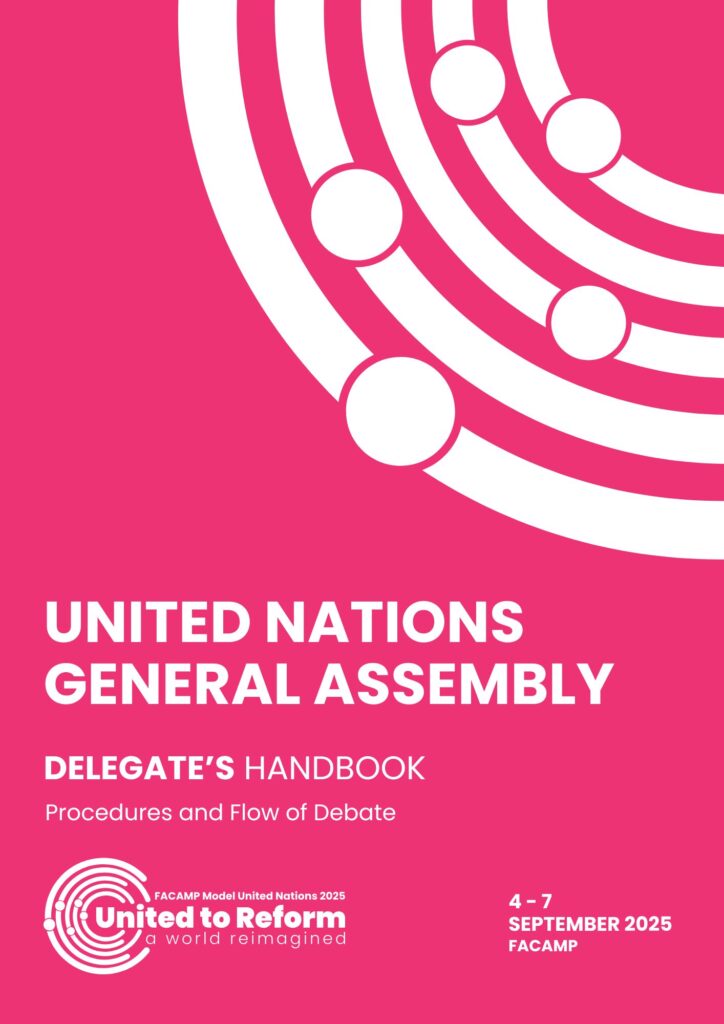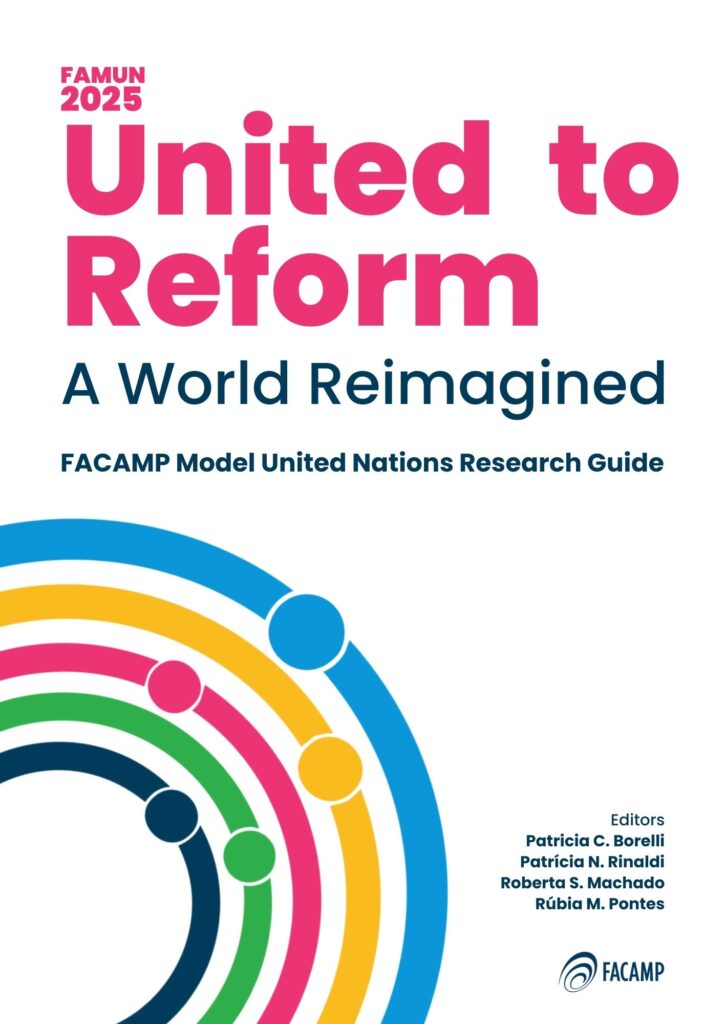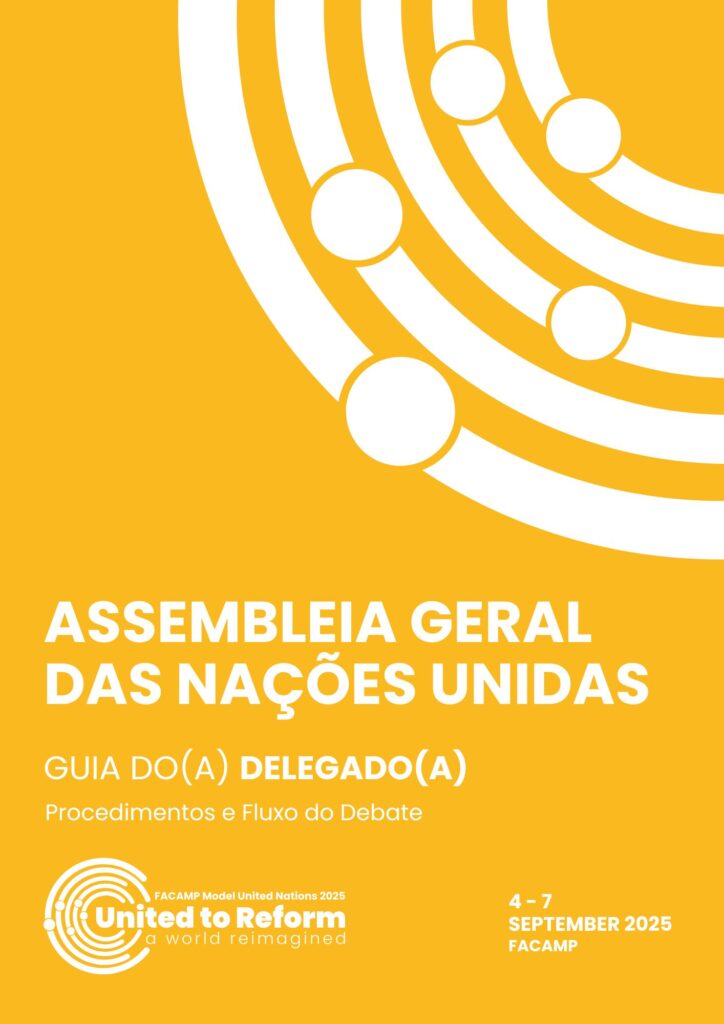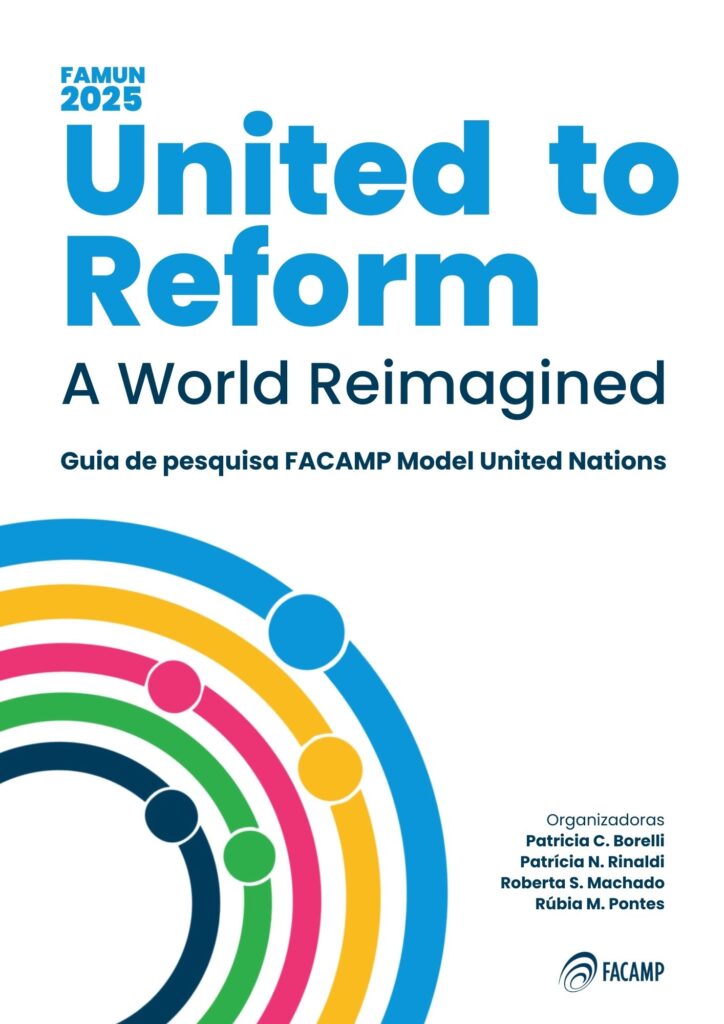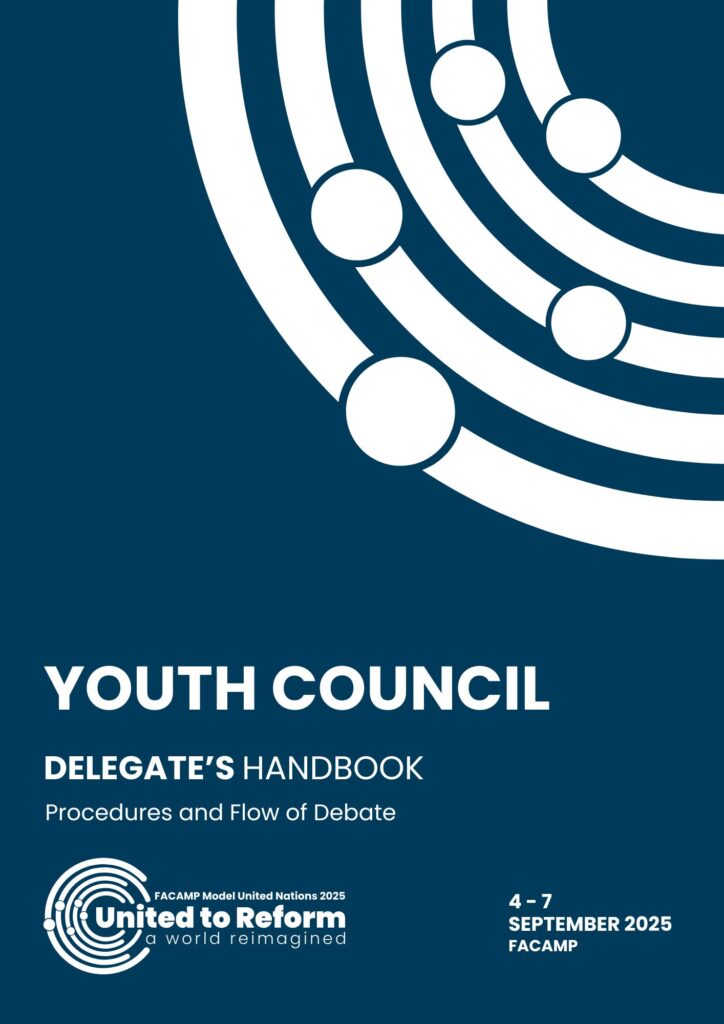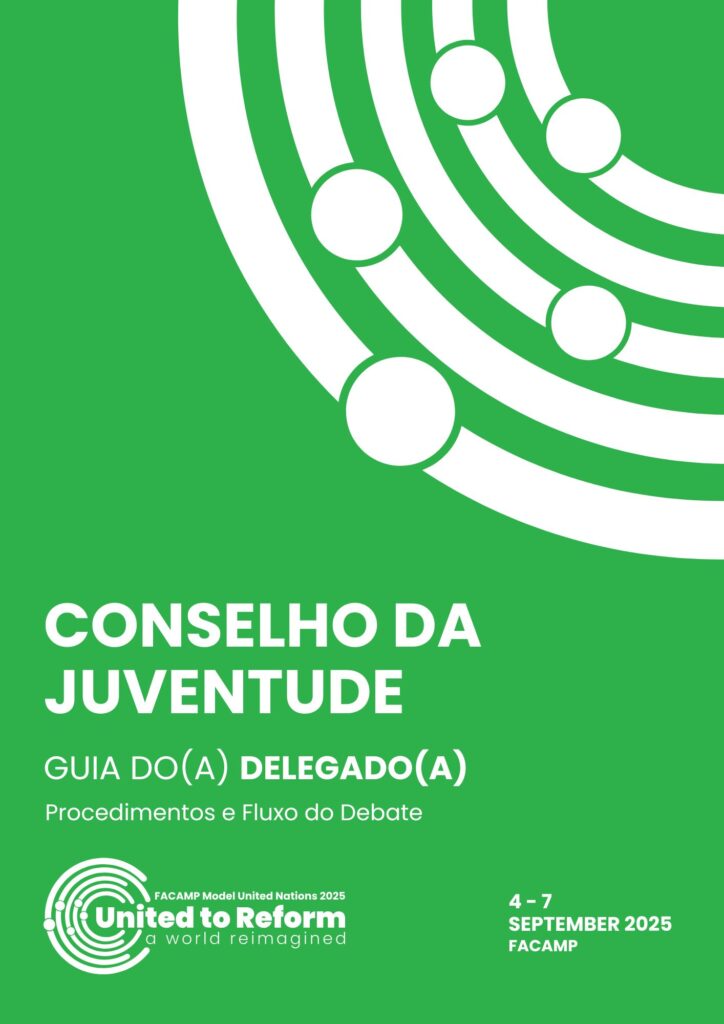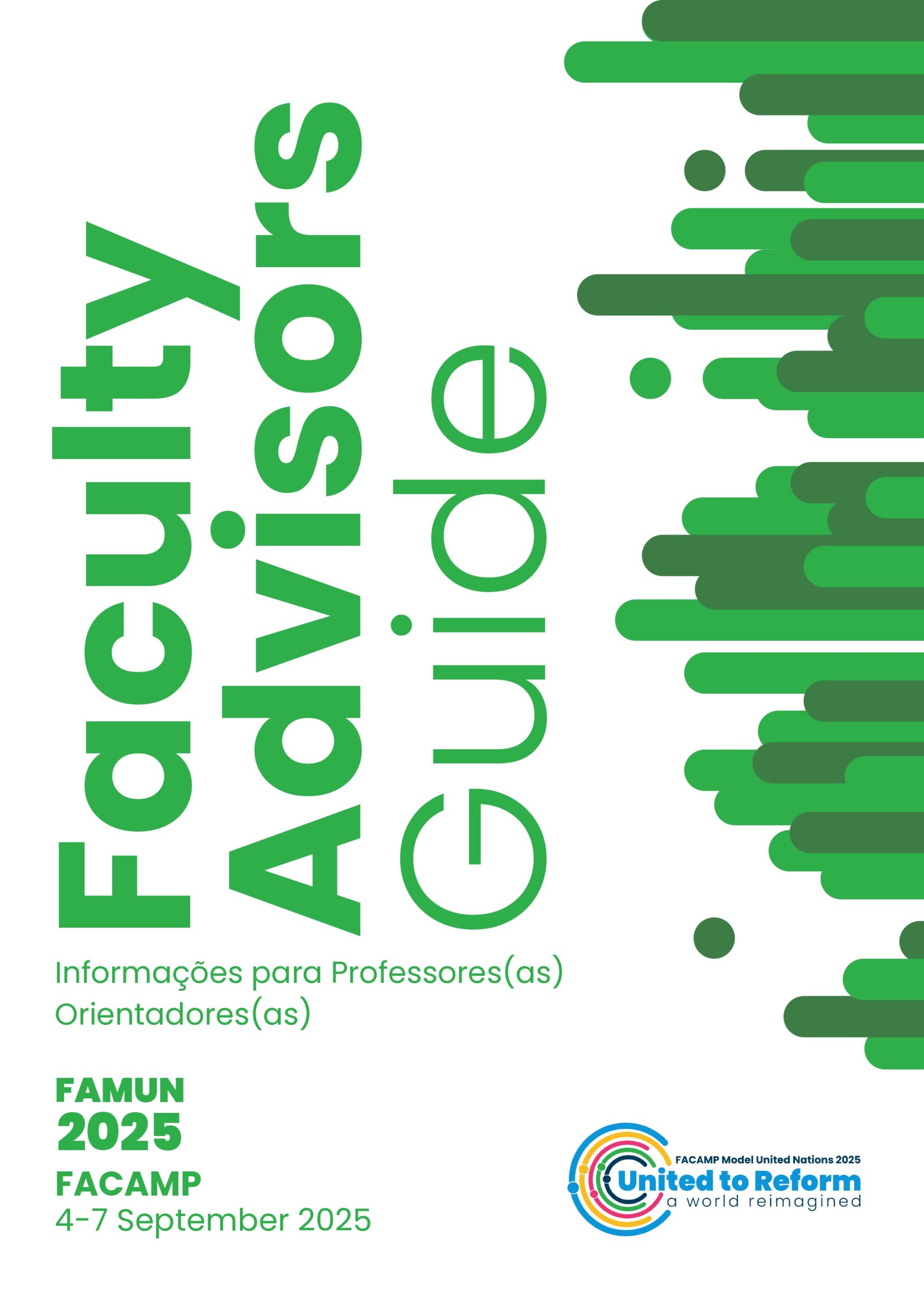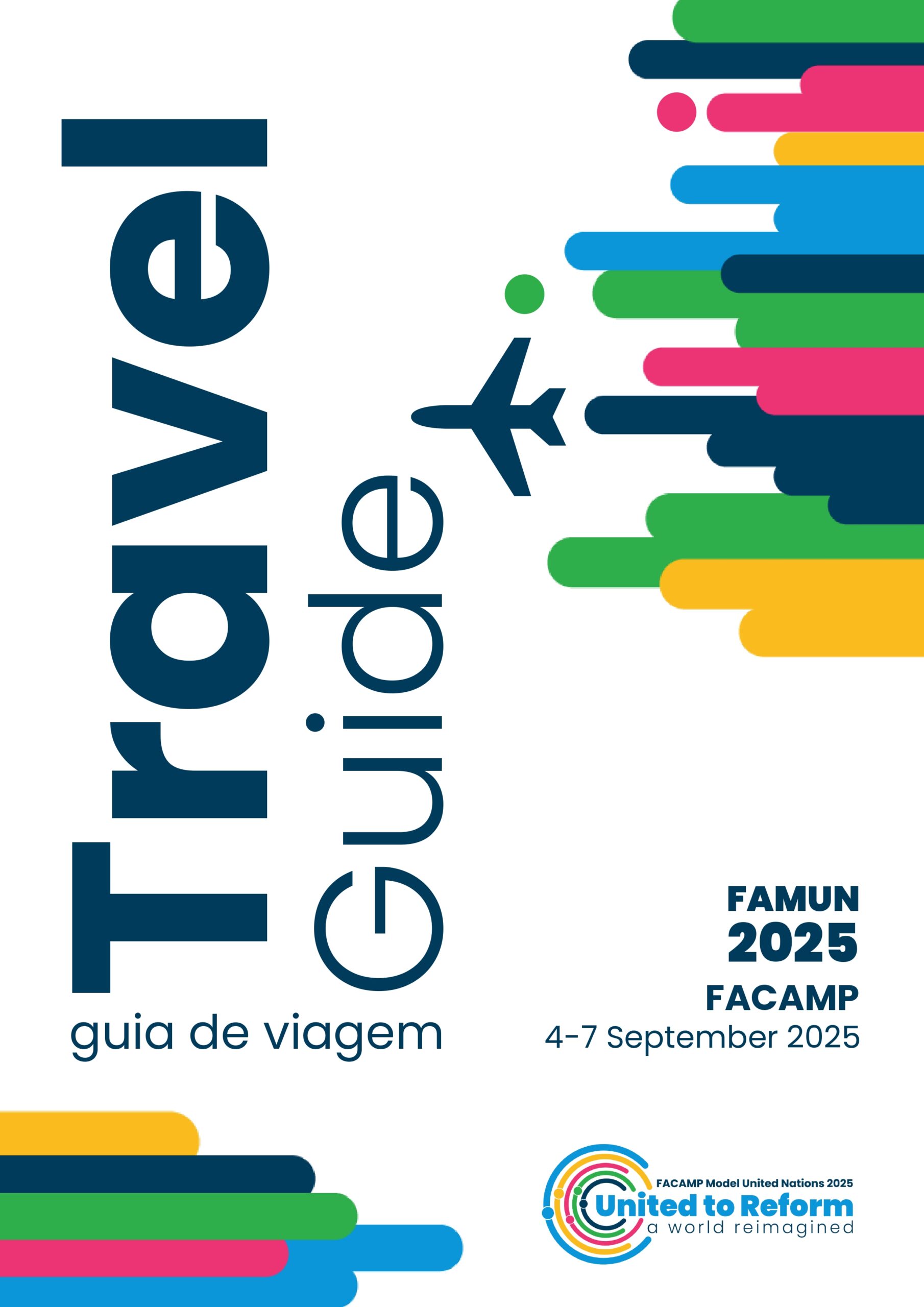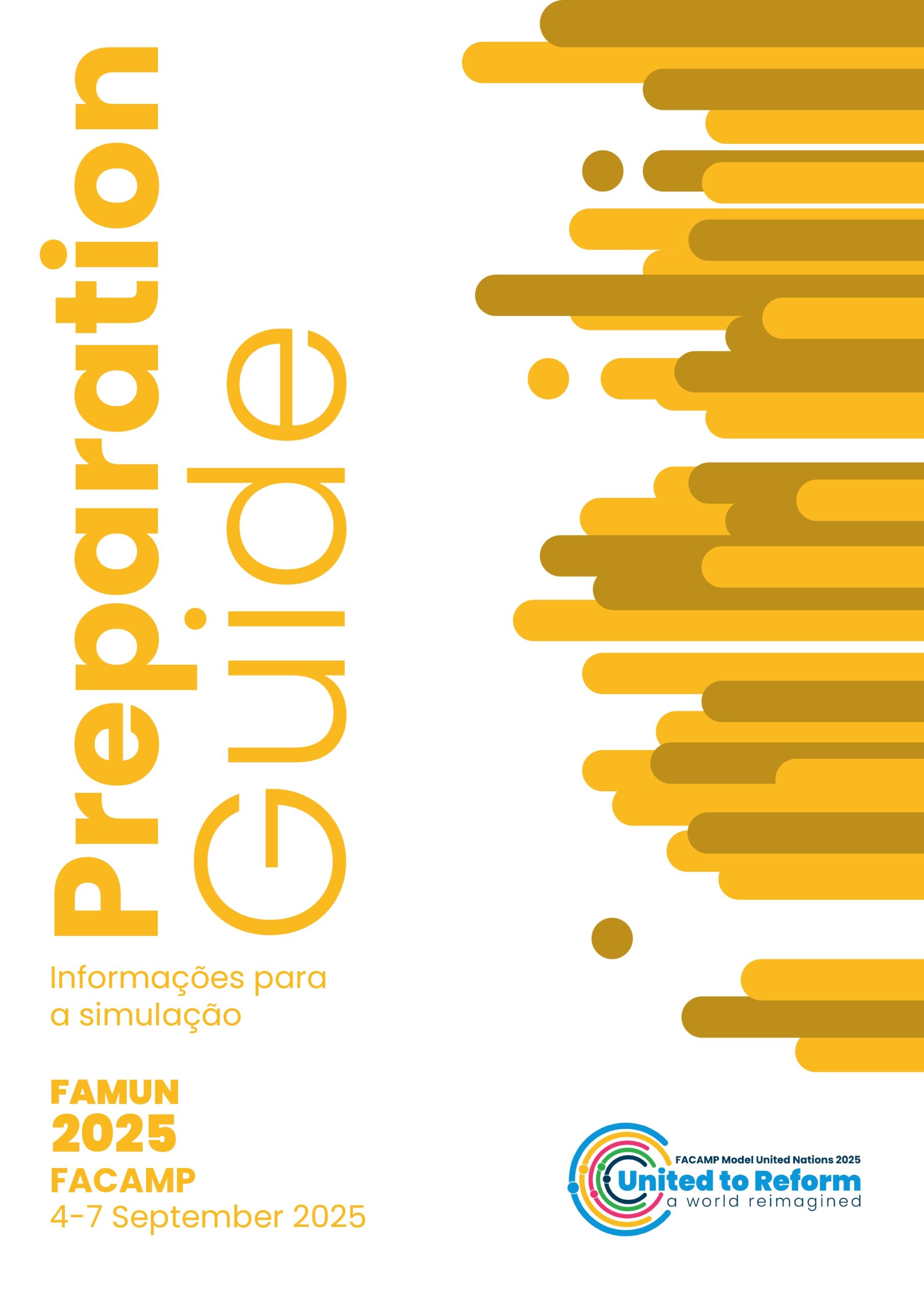PREPARATION
STUDY MATERIALS
Simulations’ Handbooks, Research Guides and Organizational Documents
Each simulation has its own Handbook, which contains the main historical aspects of the organ you will simulate, the rules of procedure and flow of debate for the conference, and important guidelines on how to write resolutions and other documents.
United Nations General Assembly (English)
Assembleia Geral das Nações Unidas (Português)
POSITION PAPER
Each delegate is expected to submit a Position Paper, which is a statement indicating your country’s position that serves as your introduction to your simulation. The criteria for Position Papers are as follows:
- Position Papers must be written and submitted by each delegate to be considered for an award. Position Papers are to be submitted to the Registration System.
- Position Papers will be made available so other delegates can read your initial position about the negotiation.
- Position Papers are to be submitted no later than 25 August 2025, 23:59 (BRT). Delegates who submit after the deadline will not be considered eligible for Awards.
Position paper format
Position Papers should be about one to two pages long in total. The issues to be addressed in the Position Paper are:
- Set the context: What are the main elements of the problem that you will be discussing? Why is this issue relevant and important to the international community? Use statistics when appropriate.
- Summarize actions taken: Draw attention to actions taken by the UN and other Member States that your representation thinks should be highlighted. Mention any actions that your representation may have taken.
- State solutions: Clearly state what proposals your representation will support to address the issue that will be discussed.
- References: List the main references and research material you have used to write your Position Paper.
- Language: The position paper should be written in the language of your simulation.
NOTE: Participants agree that all materials produced for this conference will be original work. Plagiarism will not be tolerated at FAMUN, and should the Secretariat discover instances of plagiarism, the individual will be disqualified from the conference without a refund.
You can download the format and an example of the Position Paper:
How to submit
You need to submit your Position Paper through our Registration System. Log in with your Username and Password and attach your position paper in the “Documents” field.
Each delegate and faculty advisor can attach his/her own files, or one member of the delegation can attach all the files. It is up to your delegation.
Just make sure to name the position paper file as follows:
Path_SimulationSymbol_Representation_Your Name
Examples:
High School_UNGA1_Brazil_Maria Santos
High School_UNGA2_Brazil_Maria Santos
High School_UNGA3_Brazil_Maria Santos
High School_UNGA4_Brazil_Maria Santos
High School_UNGA5_Brazil_Maria Santos
High School_UNGA6_Brazil_Maria Santos
High School_YC1_Brazil_Maria Santos
High School_YC2_Brazil_Maria Santos
University_UNGA_Brazil_Maria Santos
SPEECHES AND SPEAKERS' LIST
Each simulation has its specific rules regarding the statements during the respective formal meeting. This is an important moment to present your country’s position and priorities to the negotiation. You can prepare your statement in advance. Check the specific rules below.
FAMUN Opening Plenary
High School and University delegates assigned both to FAMUN 2025 United Nations General Assembly or Youth Council have the opportunity to deliver a statement during the Opening Plenary General Debate.
Attention to the specific rules:
From 22 July to 25 August 2025, delegates will be able to apply to deliver a statement in the Opening Plenary. Those interested should fill in the Google Form and submit their written statements. The Secretariat will select the best 15 statements to deliver their speeches during the Opening Plenary. The list of the selected delegates will be posted on FAMUN’s Instagram on 29 August 2025.
The theme of the speech in the Opening Plenary is “United to Reform: A World Reimagined”. Speeches should have a maximum of 2 minutes for each statement. Each country can only make one statement during the Plenary. Speeches should be delivered in English.
The beginning of the speeches in the Opening Plenary General Debate should be as follows:
Ms. Kaiani Angelim, Secretary-General of FAMUN 2025;
Ladies and Gentlemen Heads of State, Government and Delegations;
Ladies and Gentlemen.
I would like to congratulate you, Ms. Yasmin Alves, on your election as President of the General Assembly.
Madam President…
UNGA General Debate
Delegates assigned to the United Nations General Assembly have the opportunity to make a statement during the UNGA General Debate. Delegates should express their intention to do so on their Position Papers. This speech is about the specific topic you are reviewing the United Nations Charter. If you are reviewing the Preamble and Chapter I, your statement should discuss your proposals for this part of the UN Charter. Otherwise, if you are reviewing Chapter V, your statement should discuss your proposals for this specific Chapter. Statements should be delivered in the language of the simulation. Speeches should have a maximum of 2 minutes for individual States for each statement.
The beginning of the speeches in the General Debate should be as follows:
In Portuguese:
Obrigado(a), senhor/senhora Chair.
Senhor/Senhora Chair,
(…)
In English:
Thank you, Mr./Madam Chair.
Mr./Madam Chair,
(…)
The speaking order for each Assembly will be determined by the order in which Position Papers are submitted. Delegates who wish to make a statement on their Assemblies but have not indicated that on their position papers, can include their names on the Speakers’ List before the beginning of the First Session.
Youth Council General Debate
Delegates assigned to the FAMUN 2025 Youth Council also have the opportunity to make a statement during the Youth Council General Debate. Delegates should express their intention to do so on their Position Papers. This speech is about the specific topic you are reviewing in the United Nations Charter. If you are reviewing the Preamble and Chapter I, your statement should discuss your proposals for this part of the UN Charter. Otherwise, if you are reviewing Chapter V, your statement should discuss your proposals for this specific Chapter.Statements should be delivered in the language of the simulation. Speeches should have a maximum of 2 minutes for individual States for each statement.
The beginning of the speeches in the General Debate should be as follows:
In Portuguese:
Obrigado(a), senhor/senhora Chair.
Senhor/Senhora Chair,
(…)
In English:
Thank you, Mr./Madam Chair.
Mr./Madam Chair,
(…)
The speaking order for each Assembly will be determined by the order in which Position Papers are submitted. Delegates who wish to make a statement on their Assemblies but have not indicated that on their position papers, can include their names on the Speakers’ List before the beginning of the First Session.
AWARDS CRITERIA
Content provided to FAMUN as part of the WIMUN affiliation
The following awards will be given out at FAMUN:
Diplomacy Awards
Each simulation will award a single Diplomacy Award to the delegate that best exhibits the spirit of diplomacy. The Diplomacy Award represents the delegate in the simulation that pursued consensus, cooperation, and negotiation throughout the conference. Delegates who are awarded a Diplomacy Award at FAMUN must fulfill the following criteria during the entire conference:
- Act in the spirit of the United Nations and its values;
- Actively pursue consensus throughout negotiations;
- Contributes enthusiastically to the drafting of a resolution and raises issues relevant to the pursuit of consensus;
- Actively listens to concerns of other delegations;
- Actively proposes alternative solutions and compromises during Informal Negotiations;
- Engage with other delegates diplomatically and respectfully;
- Be prepared for opening remarks which are informative with regards to the country’s policy and ensure that other delegates gain an understanding of the position the country a delegate is representing;
- Have submitted a Position Paper prior to the conference and actively reflect the positions and solutions proposed in it throughout simulation sessions;
- Attend all simulation sessions.
Position Paper Award
Each simulation will award a single Position Paper Award to the delegate whose document demonstrates exemplary writing and understanding of the topic at hand. A document worthy of the Position Paper Award will:
- Follow the structure outlined by FAMUN 2025 and organize its ideas thoughtfully;
- Utilize thoughtful, concise grammar and language;
- Reflect a firm grasp on the simulation topic of debate;
- Be solution-oriented and acknowledge other points of view;
- Original writing and no plagiarism.
